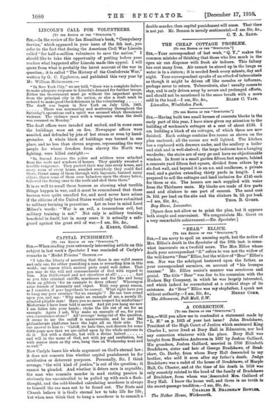LINCOLN'S CALL FOR VOLUNTEERS. [To THE EDITOR OF THE "SPECTATOR.")
Sin,—In the review of Sir Ian Hamilton's book, "Compulsory Service," which appeared in your issue of the 5th inst., you refer to the fact that during the American Civil War Lincoln called "for half-a.million volunteers to save the nation." I should like to take this opportunity of putting before your readers what happened after Lincoln made this appeal. I will quote from what is probably the latest account of the war in question ; it is called "The History of the Confederate War,"
written by G. C. Eggleston, and published this very year by Mr. William Heinemann :—
" In New York City," we are told, "there was a complete failure
to make adequate response to Lincoln's demand for further troops Either the Government must go without the important quota from the principal city in the nation, or else a draft must be
ordered to make good the deficiencies in the volunteering The draft was begun in New York on July 11th, 1863
There was murmuring and muttering throughout the Saturday's operations and a spirit was aroused which threatened violence. The violence came with a vengeance when the draft was resumed on Monday."
The draft offices were invaded and sacked, and in some cases
the buildings were set on fire. Newspaper offices were assailed, and defended by jets of hot steam or even by hand- grenades. A whole block of buildings was burned in one place, and no less than eleven negroes, representing the very people for whose freedom from slavery the North was fighting, were killed outright :—
"In Second Avenue the police and soldiers were attacked from the roofs and windows of houses. They quickly wreaked a terrible vengeance. They pushed their way into every house, and every room of every house, assailed everybody they could find there, thrust many of them through with bayonets, brained many others, threw some of them over balusters upon the stones below, followed the fleeing ones to the roofs and shot them there."
It is as well to recall these horrors as showing what terrible things happen in war, and it must be remembered that these horrors were quite uncalled for, and need never have arisen
if the citizens of the United States would only have submitted to military training in peacetime. Let us bear in mind Lord Milner's words : "War is an evil, a tremendous evil, but military training is not." Not only is military training beneficial in itself, but in many cases it is actually a safe- guard against the great evil of war.—I am, Sir, &c.,
A. KEENE, Colonel.






















































 Previous page
Previous page